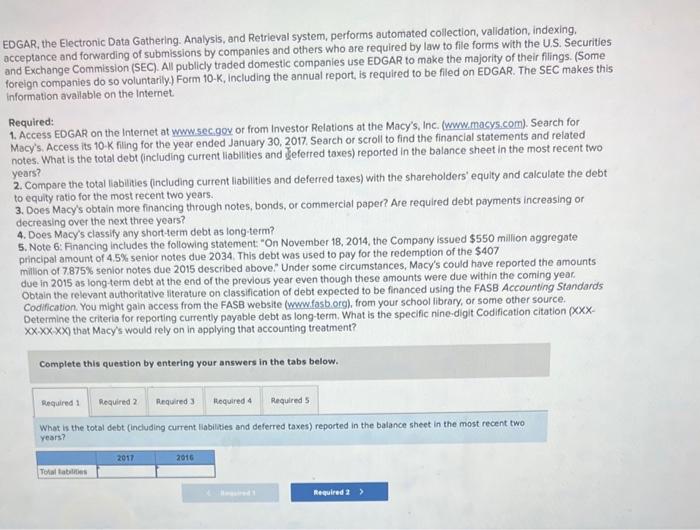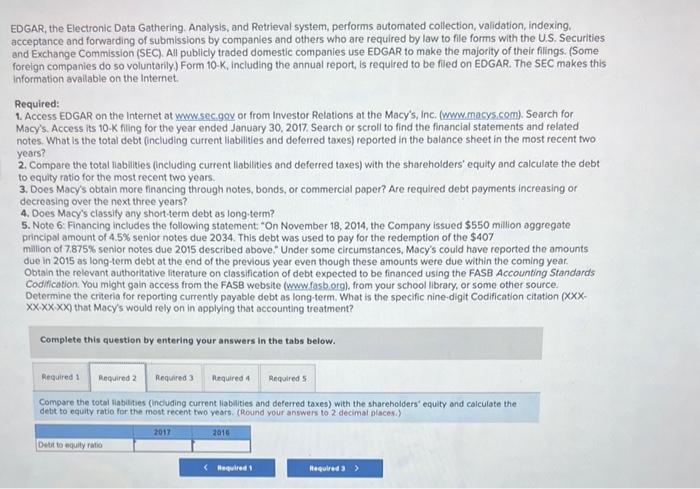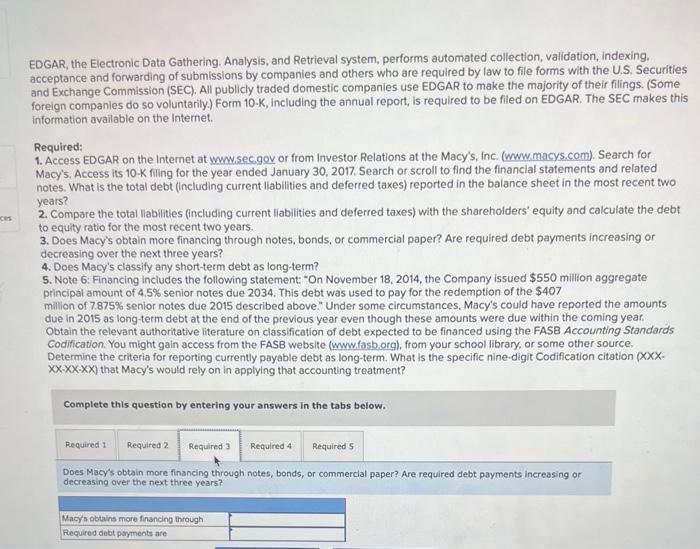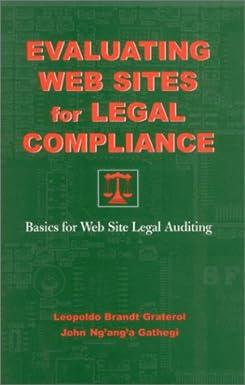EDGAR, the Electronic Data Gathering. Analysis, and Retrieval system, performs automated collection, validation, indexing. acceptance and forwarding of submissions by companies and others who are required by law to file forms with the U.S. Securities and Exchange Commission (SEC). All publicly traded domestic companies use EDGAR to make the majority of their filings. (Some foreign companies do so voluntarily.) Form 10-K, including the annual report, is required to be filed on EDGAR. The SEC makes this information available on the internet 1. Access EDGAR on the Internet at www.secgov or from Investor Relations at the Macy's, Inc. (www.macys.com). Search for. Required: Macy's. Access its 10- K filing for the year ended January 30, 2017. Search or scroll to find the financial statements and related notes. What is the total debt (including current liabilities and deferred taxes) reported in the balance sheet in the most recent two 2. Compare the total liabilities (including current liabilities and deferred taxes) with the shareholders' equity and calculate the debt years? to equity ratio for the most recent two years. 3. Does Macy's obtain more financing through notes, bonds, or commercial paper? Are required debt payments increasing or decreasing over the next three years? 4. Does Macy's classify any shortterm debt as long-term? 5. Note 6 : Financing includes the following statement: "On November 18, 2014, the Company issued $550 million aggregate principal amount of 4.5% senior notes due 2034. This debt was used to pay for the redemption of the $407 million of 7.875\% senior notes due 2015 described above." Under some circumstances. Macy's could have reported the amounts due in 2015 as long term debt at the end of the previous year even though these amounts were due within the coming year. Obtain the relevant authoritotive fiterature on classification of debt expected to be financed using the FASB Accounting Standards Codification. You might gain access from the FASB website (wwwifasb. org), from your school library, or some other source. Determine the criteria for reporting currently payable debt as long-term. What is the specific nine-digit Codification citation (XX XXXXXXX that Macy's would rely on in applying that accounting treatment? Complete this question by entering your answers in the tabs below. What is the total debt (including current habilities and deferred taxes) reported in the balance sheet in the most recent two years? EDGAR, the Electronic Data Gathering. Analysis, and Retrieval system, performs automated collection, validation, indexing. acceptance and forwarding of submissions by companies and others who are required by law to file forms with the U.S. Securities and Exchange Commission (SEC). All pubilicly traded domestic companies use EDGAR to make the majority of their filings. (Some foreign companies do so voluntarily) Form 10-K, including the annual report, is required to be fied on EDGAR. The SEC makes this information avallable on the Internet. Required: 1. Access EDGAR on the Internet at www.sec.gav or from Investor Relations at the Macy's, Inc. (www.macys.com). Search for Macy's. Access its 10-K filing for the year ended January 30. 2017. Search or scroll to find the financial statements and related notes. What is the total debt (including current liabilities and deferred taxes) reported in the balance sheet in the most recent two years? 2. Compare the total ilabilities (including current liabilities and deferred taxes) with the shareholders' equity and calculate the debt to equity ratio for the most recent two years. 3. Does Macy's obtain more financing through notes, bonds, or commercial poper? Are required debt payments increasing of decreasing over the next three years? 4. Does Macy's classify any shortterm debt as long-term? 5. Note 6: Financing includes the following statement: "On November 18, 2014, the Company issued $550 million aggregate principal amount of 4.5% senlor notes due 2034. This debt was used to pay for the redemption of the $407 million of 7.875% senior notes due 2015 described above, Under some circumstances. Macy's could have reported the amounts due in 2015 as long-term debt at the end of the previous year even though these amounts were due within the coming year. Obtain the relevant authoritative literature on classification of debt expected to be financed using the FASB Accounting Standards Codification You might gain access from the FASB website (www fasb. Org), from your school llbrary, or some other source. Determine the criteria for reporting currently payable debt as long-term. What is the specific nine-digit Codification citation (x xXxxX, that Macy's would rely on in applying that accounting treatment? Complete this question by entering your answers in the tabs below. Compare the total liabities (inoluding current liabilies and deferred taxes) with the shareholders' equily and calculate the debt to equity ratio for the most recent two years. (Round your answers to 2 decimal plsces.) EDGAR, the Electronic Data Gathering. Analysis, and Retrieval system, performs automated collection, validation, indexing. acceptance and forwarding of submissions by companies and others who are required by law to file forms with the U.S. Securities and Exchange Commission (SEC). All publicly traded domestic companies use EDGAR to make the majority of their filings. (Some foreign companies do so voluntarily.) Form 10-K, including the annual report, is required to be filed on EDGAR. The SEC makes this information available on the internet. Required: 1. Access EDGAR on the Internet at www.sec.gov or from Investor Relations at the Macy's, Inc. (www.macys. com). Search for Macy's. Access its 10-K filing for the year ended January 30, 2017. Search or scroll to find the financial statements and related notes. What is the total debt (including current liabilities and deferred taxes) reported in the balance sheet in the most recent two years? 2. Compare the total liabilites (including current liabilities and deferred taxes) with the shareholders' equity and calculate the debt to equity ratio for the most recent two years. 3. Does Macy's obtain more financing through notes, bonds, or commercial paper? Are required debt payments increasing or decreasing over the next three years? 4. Does Macy's classify any short-term debt as long-term? 5. Note 6: Financing includes the following statement: "On November 18,2014 , the Company issued $550 million aggregate principal amount of 4.5% senior notes due 2034 . This debt was used to pay for the redemption of the $407 million of 7.875% senior notes due 2015 described above." Under some circumstances, Macy's could have reported the amounts due in 2015 as long-term debt at the end of the previous year even though these amounts were due within the coming year. Obtain the relevant authoritative literature on classification of debt expected to be financed using the FASB Accounting Standards Codification. You might gain access from the FASB website (www.fasb.org), from your school library, or some other source. Determine the criteria for reporting currently payable debt as long-term. What is the specific nine-digit Codification citation (XXXXXXXXX) that Macy's would rely on in applying that accounting treatment? Complete this question by entering your answers in the tabs below. Does Macy's obtain more finanding through notes, bonds, or commercial paper? Are required debt payments increasing or decreasing over the next three years? EDGAR, the Electronic Data Gathering. Analysis, and Retrieval system, performs automated collection, validation, indexing. acceptance and forwarding of submissions by companies and others who are required by law to file forms with the U.S. Securities and Exchange Commission (SEC). All publicly traded domestic companies use EDGAR to make the majority of their filings. (Some foreign companies do so voluntarily.) Form 10-K, including the annual report, is required to be filed on EDGAR. The SEC makes this information available on the internet 1. Access EDGAR on the Internet at www.secgov or from Investor Relations at the Macy's, Inc. (www.macys.com). Search for. Required: Macy's. Access its 10- K filing for the year ended January 30, 2017. Search or scroll to find the financial statements and related notes. What is the total debt (including current liabilities and deferred taxes) reported in the balance sheet in the most recent two 2. Compare the total liabilities (including current liabilities and deferred taxes) with the shareholders' equity and calculate the debt years? to equity ratio for the most recent two years. 3. Does Macy's obtain more financing through notes, bonds, or commercial paper? Are required debt payments increasing or decreasing over the next three years? 4. Does Macy's classify any shortterm debt as long-term? 5. Note 6 : Financing includes the following statement: "On November 18, 2014, the Company issued $550 million aggregate principal amount of 4.5% senior notes due 2034. This debt was used to pay for the redemption of the $407 million of 7.875\% senior notes due 2015 described above." Under some circumstances. Macy's could have reported the amounts due in 2015 as long term debt at the end of the previous year even though these amounts were due within the coming year. Obtain the relevant authoritotive fiterature on classification of debt expected to be financed using the FASB Accounting Standards Codification. You might gain access from the FASB website (wwwifasb. org), from your school library, or some other source. Determine the criteria for reporting currently payable debt as long-term. What is the specific nine-digit Codification citation (XX XXXXXXX that Macy's would rely on in applying that accounting treatment? Complete this question by entering your answers in the tabs below. What is the total debt (including current habilities and deferred taxes) reported in the balance sheet in the most recent two years? EDGAR, the Electronic Data Gathering. Analysis, and Retrieval system, performs automated collection, validation, indexing. acceptance and forwarding of submissions by companies and others who are required by law to file forms with the U.S. Securities and Exchange Commission (SEC). All pubilicly traded domestic companies use EDGAR to make the majority of their filings. (Some foreign companies do so voluntarily) Form 10-K, including the annual report, is required to be fied on EDGAR. The SEC makes this information avallable on the Internet. Required: 1. Access EDGAR on the Internet at www.sec.gav or from Investor Relations at the Macy's, Inc. (www.macys.com). Search for Macy's. Access its 10-K filing for the year ended January 30. 2017. Search or scroll to find the financial statements and related notes. What is the total debt (including current liabilities and deferred taxes) reported in the balance sheet in the most recent two years? 2. Compare the total ilabilities (including current liabilities and deferred taxes) with the shareholders' equity and calculate the debt to equity ratio for the most recent two years. 3. Does Macy's obtain more financing through notes, bonds, or commercial poper? Are required debt payments increasing of decreasing over the next three years? 4. Does Macy's classify any shortterm debt as long-term? 5. Note 6: Financing includes the following statement: "On November 18, 2014, the Company issued $550 million aggregate principal amount of 4.5% senlor notes due 2034. This debt was used to pay for the redemption of the $407 million of 7.875% senior notes due 2015 described above, Under some circumstances. Macy's could have reported the amounts due in 2015 as long-term debt at the end of the previous year even though these amounts were due within the coming year. Obtain the relevant authoritative literature on classification of debt expected to be financed using the FASB Accounting Standards Codification You might gain access from the FASB website (www fasb. Org), from your school llbrary, or some other source. Determine the criteria for reporting currently payable debt as long-term. What is the specific nine-digit Codification citation (x xXxxX, that Macy's would rely on in applying that accounting treatment? Complete this question by entering your answers in the tabs below. Compare the total liabities (inoluding current liabilies and deferred taxes) with the shareholders' equily and calculate the debt to equity ratio for the most recent two years. (Round your answers to 2 decimal plsces.) EDGAR, the Electronic Data Gathering. Analysis, and Retrieval system, performs automated collection, validation, indexing. acceptance and forwarding of submissions by companies and others who are required by law to file forms with the U.S. Securities and Exchange Commission (SEC). All publicly traded domestic companies use EDGAR to make the majority of their filings. (Some foreign companies do so voluntarily.) Form 10-K, including the annual report, is required to be filed on EDGAR. The SEC makes this information available on the internet. Required: 1. Access EDGAR on the Internet at www.sec.gov or from Investor Relations at the Macy's, Inc. (www.macys. com). Search for Macy's. Access its 10-K filing for the year ended January 30, 2017. Search or scroll to find the financial statements and related notes. What is the total debt (including current liabilities and deferred taxes) reported in the balance sheet in the most recent two years? 2. Compare the total liabilites (including current liabilities and deferred taxes) with the shareholders' equity and calculate the debt to equity ratio for the most recent two years. 3. Does Macy's obtain more financing through notes, bonds, or commercial paper? Are required debt payments increasing or decreasing over the next three years? 4. Does Macy's classify any short-term debt as long-term? 5. Note 6: Financing includes the following statement: "On November 18,2014 , the Company issued $550 million aggregate principal amount of 4.5% senior notes due 2034 . This debt was used to pay for the redemption of the $407 million of 7.875% senior notes due 2015 described above." Under some circumstances, Macy's could have reported the amounts due in 2015 as long-term debt at the end of the previous year even though these amounts were due within the coming year. Obtain the relevant authoritative literature on classification of debt expected to be financed using the FASB Accounting Standards Codification. You might gain access from the FASB website (www.fasb.org), from your school library, or some other source. Determine the criteria for reporting currently payable debt as long-term. What is the specific nine-digit Codification citation (XXXXXXXXX) that Macy's would rely on in applying that accounting treatment? Complete this question by entering your answers in the tabs below. Does Macy's obtain more finanding through notes, bonds, or commercial paper? Are required debt payments increasing or decreasing over the next three years









